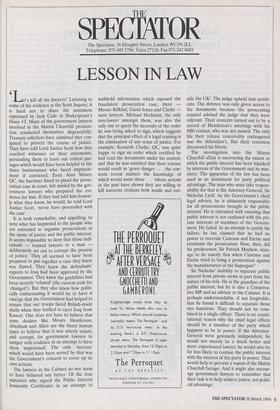SPECT THE AT OR The Spectator, 56 Doughty Street, London WC1N 2LL
Telephone: 071-405 1706; Telex 27124; Fax 071-242 0603
LESSON IN LAW
Let's kill all the lawyers!' Listening to some of the evidence at the Scott Inquiry, it is hard not to share the sentiment expressed by Jack Cade in Shakespeare's Henry VI. Many of the government lawyers involved in the Matrix Churchill prosecu- tion conducted themselves disgracefully. Treasury solicitors have admitted they con- spired to pervert the course of justice. They have told Lord Justice Scott how they coached witnesses on their statements, persuading them to leave out critical pas- sages which would have been helpful to the three businessmen who faced imprison- ment if convicted. Even Alan Moses, QC, the barrister hired to plead the prose- cution case in court, felt misled by the gov- ernment lawyers who prepared the evi- dence for him. If they had told him honest- ly what they knew, he would, he told Lord Justice Scott, 'never have proceeded with the case'.
It is both remarkable, and appalling, to note what has happened to the people who are entrusted to organise prosecutions in the name of justice and the public interest. It seems impossible to deny that these indi- viduals — trained lawyers to a man — deliberately set out to corrupt the process of justice. They all seemed to have been prepared to put together a case they knew was flawed. They knew the defendants' exports to Iraq had been approved by the Government. They knew the guidelines had been secretly 'relaxed' (the current code for `changed'). But they also knew how politi- cally embarrassing it would be to have it emerge that the Government had helped to ensure that our troops faced British-made shells when they battled to eject Iraq from Kuwait. One does not have to believe that arms dealers like Messrs Henderson, Abraham and Allen are the finest human types to believe that it was utterly unjust, and corrupt, for government lawyers to tamper with evidence in an attempt to have them imprisoned. The only 'interest' which would have been served by that was the Government's concern to cover up its own actions.
The lawyers in the Cabinet do not seem to have behaved any better. Of the four ministers who signed the Public Interest Immunity Certificates in an attempt to withhold information which exposed the fraudulent prosecution case, three — Messrs Rifkind, Garel-Jones and Clarke — were lawyers. Michael Hesletine, the only non-lawyer amongst them, was also the only one to query the necessity of the order he was being asked to sign, which suggests that the principal effect of a legal training is the elimination of any sense of justice. For example, Kenneth Clarke, QC, was quite happy to sign an order which certified he had read the documents under his control, and that he was satisfied that their release would result in 'grave danger . . . the con- tents reveal matters the knowledge of which would assist those . . . whose actions in the past have shown they are willing to kill innocent civilians both inside and out- side the UK'. The judge upheld that certifi- cate. The defence was only given access to the documents because the prosecuting counsel advised the judge that they were relevant. Their contents turned out to be a record of Henderson's meetings with his MI6 contact, who was not named. The only life their release conceivably endangered was the defendant's. But their retention threatened his liberty.
The investigation into the Matrix Churchill affair is uncovering the extent to which the public interest has been hijacked by interests of the Government and its min- isters. The apparatus of the law has been used as an instrument for party political advantage. The man who must take respon- sibility for that is the Attorney-General, Sir Nicholas Lyell. As the Government's chief legal advisor, he is ultimately responsible for all prosecutions brought in the public interest. He is entrusted with ensuring that public interest is not confused with the pri- vate interests of members of the Govern- ment. He failed. In an attempt to justify his failure, he has claimed that he had no power to overrule Customs and Excise and terminate the prosecution. How, then, did his predecessor, Sir Patrick Mayhew, man- age to do exactly that when Customs and Excise tried to bring a prosecution against the manufacturers of the Supergun?
Sir Nicholas' inability to separate public interest from private stems in part from the nature of his role. He is the guardian of the public interest, but he is also a Conserva- tive MP and an advisor to the Cabinet. It is perhaps understandable, if not forgivable, that he found it difficult to separate those two functions. They should not be com- bined in a single officer. There is no consti- tutional reason why the chief legal officer should be a member of the party which happens to be in power. If the Attorney- General were genuinely independent, he would not merely be a much better and more experienced lawyer; he would also be far less likely to confuse the public interest with the interest of the party in power. That would help to prevent a repeat of the Matrix Churchill farrago. And it might also encour- age government lawyers to remember that their task is to help achieve justice, not politi- cal advantage.


























































 Previous page
Previous page